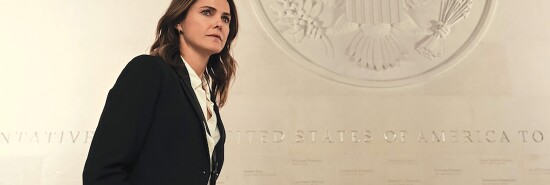
Keri Russell saves The Diplomat from itself
Graham Hillard
Netflix’s The Diplomat is so blandly titled that I forgot its name five minutes after agreeing to review it. The Development? The Directive? The Delegate? No matter. Just search “Keri Russell” and “international intrigue.” It should pop right up.
Russell is most famous for two seemingly dissimilar roles. In Felicity (1998-2002), a Dawson’s Creek competitor for the college set, she played an undergrad crossed in love at a lightly fictionalized NYU. The Americans (2013-2018), meanwhile, saw her trade in her textbooks for the cover story and hit list of a Soviet agent on U.S. soil. One would think these excursions required entirely different muscles, like climbing a mountain and walking a labradoodle. Yet watch old Felicity clips on YouTube. The spy’s amiable exterior is there, but so, fleetingly, is the inner steel.
DIRTY HARRY DOES POLITICAL THEORY
This flintiness is at the heart of Russell’s work in Netflix’s latest, a political thriller that asks the actress to project grit and likability in equal measure. Russell plays career diplomat Kate Wyler, a serious brain who happens to be married to the far more famous envoy, Hal (Rufus Sewell). When, in the show’s opening moments, a British aircraft carrier is attacked off the coast of Iran, it is not Mr. Wyler but his wife whom the American president calls upon. One moment, Kate is a sharp but modest attache assigned to Kandahar, Afghanistan. The next, she is on a plane to London, having been named ambassador to a Britain that may soon be at war.
Among The Diplomat’s early problems is the unevenness of its tone as Russell’s character attempts to find her footing. Watching the “staff” greet Kate upon her arrival at the ambassadorial manor, we might be trapped in an episode of Downton Abbey, complete with a knowing head housekeeper (a very proper Penny Downie). Or has Netflix created a geopolitical My Fair Lady, missing only the rain in Spain to complete Kate’s transformation, in a number of ill-advised sequences, from pantsuited administrator to trans-Atlantic glamour girl? Though this dissonance abates somewhat over the course of the season, it never quite goes away. Note, for instance, Kate’s cartoonish brawl with Hal on the estate’s great lawn near the end of episode three. Two minutes earlier, the pair were discussing Kate’s possible ascension to the soon-to-be-vacated vice presidency, a subplot that feels, like the show as a whole, both ripped from the headlines and more than a little absurd.
Like The West Wing, for which creator and showrunner Debora Cahn wrote for four seasons, The Diplomat prefers its elected officials to conform to type. The new series’s president, played by Michael McKean, is so explicit a Biden stand-in that I kept expecting a paean to ice cream. Similarly on the nose is Rory Kinnear’s portrayal of a Blair-esque prime minister threatening to “rain hellfire” on the mullahs of Tehran. Was Dev Patel unavailable to play Rishi Sunak? To the extent that The Diplomat possesses an ideology, it is that the voting public must be saved from these bumblers by an army of unelected diplomatic and intelligence bureaucrats. In other words, Netflix’s show is about the deep state. (No such thing exists, of course. But stop opposing it, fascist.)
Joining Kate in her quest for “reasonable” foreign policies is a team of peers who may or may not be hiding ulterior motives. Billie Appiah (Nana Mensah), the president’s chief of staff, seems transparently to be preparing Kate for higher office but is a power player in her own right. One would have to be a fool to trust her. And what about Stuart Heyford (Ato Essandoh), the mission’s eager deputy? Does it matter that he’s sleeping with the wily CIA station chief, Eidra Park (Ali Ahn)? If these plot elements sound as soapy as an ambassadorial bathtub, the reader is getting the right idea. Not for Cahn and her fellow writers is diplomacy anything so grand as war by other means. Instead, the nuances of statecraft are merely background noise. The real questions are who will rise, who will fall, and who will wake up in whose bed when the sun comes up the next morning.
It may surprise the reader to hear that, despite these manifest flaws, The Diplomat is not a terrible show. Russell is simply too good a television performer to permit that. Stalking Embassy London in dress and heels, the actress fairly simmers with inner fire, never mind the overearnest writing with which her character is saddled. (The phrase “fundamental respect for institutional norms” would be boring on the lips of Laurence Olivier.) In The Americans, a masterpiece by any standard, Russell’s complicated watchability met with layered scripts and a stellar supporting cast. The Diplomat possesses one of those three. That isn’t great, but neither is it completely hopeless. Ignore the campiness, put aside the politics, and one is left with a reasonably well-formed television bauble. I can think of worse ways to spend a lazy weekend.
CLICK HERE TO READ MORE FROM THE WASHINGTON EXAMINER
Graham Hillard is the author of Wolf Intervals (Poiema Poetry Series) and a Washington Examiner magazine contributing writer.
